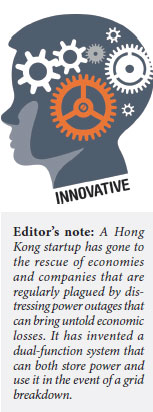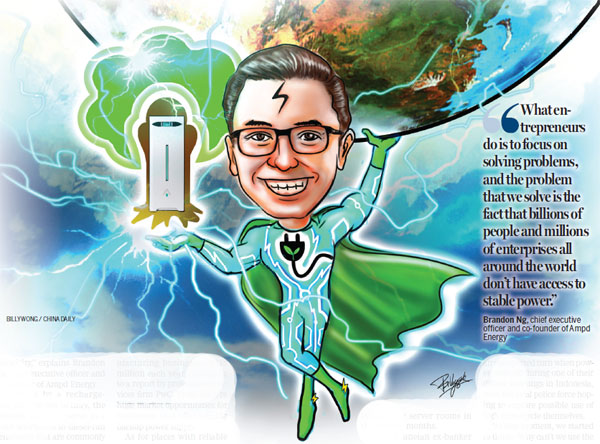Blackouts - the answer's in the tank
Updated: 2016-12-29 08:53
By Deng Yanzi in Hong Kong(HK Edition)
|
|||||||
For countries without stable power supply, a reliable backup system for power is crucial for the operation of essential facilities such as hospitals or telecommunication services.
Hong Kong startup Ampd Energy has launched an energy storage system called Ampd Silo uses that can store electricity when power is available and use it when there's an outage.
The company's system aims to function by connecting with the power grid, which can be unstable in some parts of the world, and charges up when the grid works normally. It can then start using the energy it stores to feed hospitals and homes when the grid breaks down.
"It's basically a large tank of electricity," explains Brandon Ng, chief executive officer and co-founder of Ampd Energy.

Powered by a rechargeable lithium-ion battery, the system's goal is to serve as a clean alternative to diesel-run generators that are commonly used as backup power sources, but often create severe air pollution.
The idea gained instant understanding from developing countries like Indonesia and India, which suffer from frequent blackouts, says Ng.
In Indonesia, blackouts could cost the country's manufacturing businesses $415 million each year, according to a report by professional services firm PwC. Thus, there're huge market opportunities for businesses that offer reliable backup power supply.
As for places with reliable power supply, Ng says the Ampd Silo system could soon be used in buying and storing electricity when tariffs are lower. The stored power can be used when rates go up in markets where users pay different electricity costs at different times of the day.
After two years of research and development, the system is due to begin mass production in March next year. Ampd Energy has begun customer trials in Indonesia with one of the country's biggest hospital groups, and more trials will start with Indonesian telecom companies and Hong Kong server rooms in the coming months.
Ng, a Bruneian ex-banker with an academic background in engineering, initially started an electric-motorcycle project in Beijing in 2014 with engineer Luca Valente.
Aiming to build a fast, strong vehicle, Ng and his team put a lot of efforts into developing a powerful battery for it.
The project's direction took an unexpected turn when power went off during one of their dinner meetings in Indonesia, with the local police force hoping to explore possible use of Ng's motorcycle themselves.
"At that moment, we started to think: 'Why can't we use the battery in the motorcycle to power the building?'. That was the realization that our battery is much more interesting in powering buildings than powering motorcycles," Ng recalls.
"You can say we had our light-bulb moment in a blackout," he chuckles.
The project soon began to pivot and focused on developing a battery.
To take advantage of the manufacturing capacity in the Pearl River Delta and to assemble a diverse team of talents, Ng and Valente subsequently moved to Hong Kong and joined Hong Kong Science and Technology Park Corporation's Incu-Tech incubation program last year.
"A lot of the supply chain partners we are working with on the battery side are based in southern China. The fact that the Chinese mainland government has been investing so much money in electric vehicles means massive investment in manufacturing for electric vehicles," says Ng.
Now with a 14-strong team, Ampd Energy has so far raised $3.7 million seed investment with investors, mainly from Southeast Asia.
According to Ng, the hardest part of getting his business off the ground is to gain the trust of investors, suppliers and government, especially when the business has to deal with such a big problem as electric power, which requires more input and support from all stakeholders in the startup ecosystem.
Yet, he still believes that entrepreneurs should devote themselves to "meaningful innovations" that can solve real issues, rather than merely "cool innovations".
"What entrepreneurs do is to focus on solving problems, and the problem that we solve is the fact that billions of people and millions of enterprises all around the world don't have access to stable power," he argues.
iris@chinadailyhk.com

(HK Edition 12/29/2016 page1)